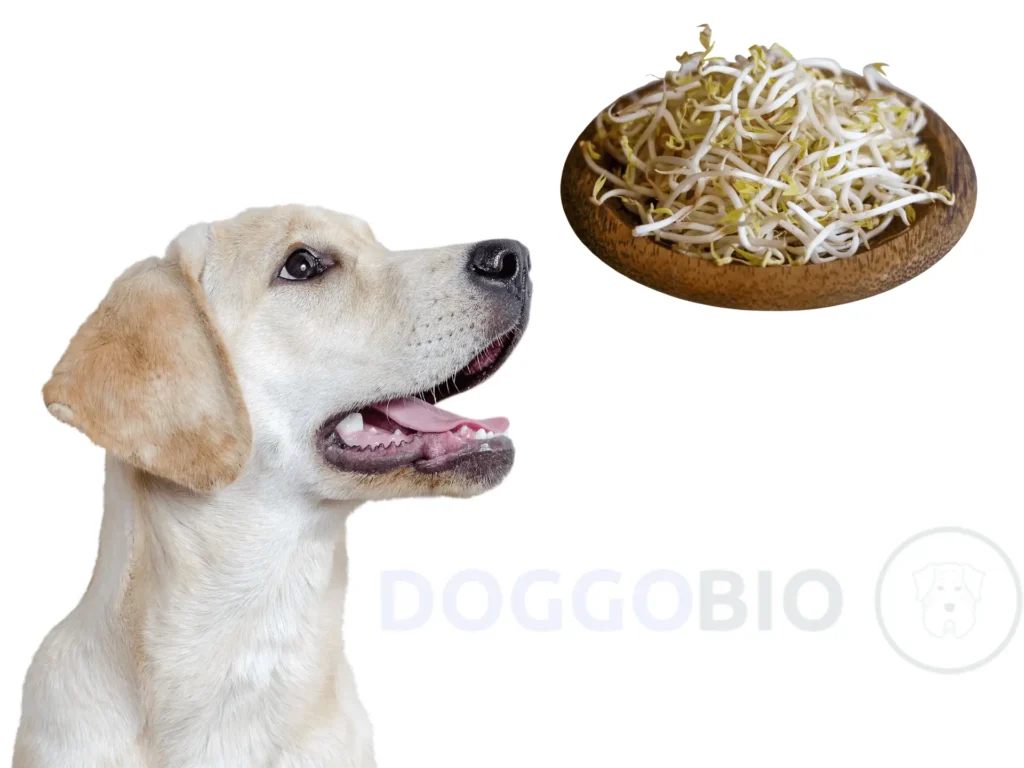As pet owners, we’re always cautious about what foods we can safely share with our furry friends. One common question that arises is whether dogs can eat bean sprouts. This nutritious vegetable, often found in salads and stir-fries, is known for its crunchy texture and health benefits for humans.
But when it comes to our canine companions, is it a safe choice? The short answer is yes, dogs can eat bean sprouts. They are not only safe but can also offer some nutritional benefits to your dog’s diet. However, there are essential considerations to remember to ensure that these sprouts are a healthy addition to your dog’s meals.
Let’s delve deeper into the world of dogs and bean sprouts, exploring the benefits, potential risks, and the best ways to serve them to your furry friend.
Can Dogs Eat Bean Sprouts?
The short answer is yes, dogs can eat bean sprouts. However, there are a few things to keep in mind before feeding them to your canine companion.

Moderation is Key
As with any new food, it is essential to introduce bean sprouts to your dog’s diet gradually. This will allow their digestive system to adjust and prevent any potential stomach upset.
Start by offering a small amount of bean sprouts and monitor your dog’s reaction. If they show discomfort, such as vomiting or diarrhea, discontinue feeding them bean sprouts.
Raw vs. Cooked Bean Sprouts
While raw bean sprouts are safe for dogs to eat, it is recommended to cook them before feeding them to your furry friend. Raw bean sprouts may contain bacteria such as E. coli and Salmonella, which can cause food poisoning in dogs.
Cooking the bean sprouts will help eliminate potentially harmful bacteria and make them easier for your dog to digest.
Avoid Seasonings and Sauces
When preparing bean sprouts for your dog, avoiding adding any seasonings or sauces is essential. These can contain ingredients harmful to dogs, such as garlic and onion. Stick to plain, cooked bean sprouts to ensure your dog’s safety.
Nutritional Value Of Bean Sprouts
Let’s first take a look at the nutritional value of this vegetable.
- Bean sprouts are low in calories and fat, making them a great addition to any diet.
- They are also a good source of vitamins C and K, folate, iron, and fiber.
- Additionally, bean sprouts contain antioxidants that can help boost the immune system and protect against diseases.

Health Benefits of Bean Sprouts for Dogs
Now that we know that dogs can safely eat bean sprouts, let’s explore the potential health benefits of this vegetable for our furry friends.
Promotes Digestive Health
Bean sprouts are a good source of fiber, which can help regulate your dog’s digestive system. This can be especially beneficial for dogs who struggle with constipation or diarrhea.
The high water content in bean sprouts can also help keep your dog hydrated, promoting healthy bowel movements.
Boosts Immune System
As mentioned earlier, bean sprouts contain antioxidants that can help boost the immune system. This can particularly benefit older dogs or those with weakened immune systems.
You can help protect your dog against diseases and infections by incorporating bean sprouts into their diet.
Supports Healthy Weight Management
Bean sprouts are low in calories and fat, making them a great addition to a weight management diet for dogs. The high fiber content can also help your dog feel full and satisfied, preventing overeating and weight gain.
Risks Of Bean Sprouts Feeding To Dogs
While bean sprouts offer nutritional benefits, there are risks associated with feeding them to dogs.

Food Poisoning
The primary concern is the potential for food poisoning. Raw bean sprouts can harbor harmful bacteria like Salmonella and E. coli, posing a risk to dogs and humans. Cooking bean sprouts can significantly reduce this risk, making them a safer option for canine consumption.
It’s crucial to ensure the sprouts are thoroughly washed and adequately cooked to eliminate potential pathogens.
Gastric Upsets
Gastric upsets are another risk to consider when feeding bean sprouts to dogs. While beneficial in moderation, the high fiber content can cause issues like gas, diarrhea, or vomiting if consumed in large amounts.
This is especially true for dogs with sensitive digestive systems or those unused to high-fiber diets. To minimize the risk of gastric upset, introduce bean sprouts gradually into your dog’s diet and monitor their reaction. If any adverse symptoms occur, it’s best to reduce the amount or eliminate bean sprouts from their diet and consult a veterinarian.
How Much Bean Sprouts Do You Give To Your Dog?
The amount of bean sprouts to feed a dog depends on the dog’s size and dietary needs. Generally, treats like bean sprouts should not make up more than 10% of a dog’s daily caloric intake.
When Can We Discontinue The Use Of Bean Sprouts?
Discontinuing bean sprouts in a dog’s diet should be considered if any adverse reactions or health concerns arise.
- Signs to watch for include digestive upset, allergic reactions, or changes in appetite or behavior. If your dog shows intolerance to bean sprouts, such as vomiting, diarrhea, or skin irritations, it’s advisable to stop feeding them this food.
- Additionally, if your dog has specific health conditions or dietary restrictions, consult a veterinarian before introducing bean sprouts or any new food.
It’s essential to prioritize your dog’s health and well-being, and discontinuing bean sprouts may be necessary if they are not well-tolerated or conflict with your dog’s dietary needs.
How To Feed Bean Sprouts To Dogs?
Now that you know the potential health benefits of feeding bean sprouts to dogs, let’s look at ways to incorporate them into your dog’s diet.
1. As a Treat
One way to feed bean sprouts to your dog is as a treat. You can offer them a small amount of cooked bean sprouts as a reward for good behavior or as a snack between meals. Just make sure to stick to moderation and avoid any seasonings or sauces.
2. Mixed with Their Regular Food
Another way to incorporate bean sprouts into your dog’s diet is by mixing them with their regular food. You can chop up some cooked bean sprouts and mix them with your dog’s kibble or wet food.
This will add some variety to their meals and provide them with the nutritional benefits of bean sprouts.
3. Homemade Dog Food
You can also include bean sprouts to make your dog food. Just make sure to cook them thoroughly and avoid any seasonings or sauces. Mix them with other dog-friendly vegetables and protein sources to create a well-balanced meal for your furry friend.
Some Posts You Wanna See More
- Can Dogs Eat Black Eyed Peas?
- Can Dogs Eat Beets?
- Can Dogs Eat Bitter Melon?
- Can Dogs Eat Banana Peppers?
- Can Dogs Eat Artichokes?
- Can Dogs Eat Amaranth?
- Can Dogs Eat Brussels Sprouts
Frequently Asked Questions
Can Puppies Eat Bean Sprouts?
No, Puppies have delicate digestive systems and may not be able to handle bean sprouts, as well as adult dogs. It is best to consult with your veterinarian before feeding bean sprouts to puppies.
Are There Any Risks of Feeding Bean Sprouts To Dogs?
As long as bean sprouts are cooked and fed in moderation, no significant risks should be associated with providing them to dogs.
However, if your dog has a sensitive stomach or any underlying health conditions, it is best to consult your veterinarian before introducing new foods into their diet.
Can Dogs Eat All Types Of Bean Sprouts?
No, while most bean sprouts are safe for dogs, it is important to avoid feeding them raw mung bean sprouts. These have been linked to outbreaks of food poisoning in humans and may also pose a risk to dogs.
Can Dogs With Allergies Eat Bean Sprouts?
No, if your dog has a known allergy to legumes, it is best to avoid feeding them bean sprouts. However, if your dog has no allergies, they should be able to consume bean sprouts safely.
Can Dogs Eat Mung Bean Sprouts?
Yes, Mung bean sprouts are safe and nutritious for dogs. They are a good source of vitamins and minerals and can be included in a dog’s diet in moderation. Ensure they are correctly prepared, either cooked or raw and introduced gradually to avoid digestive upset.
Can Dogs Eat Raw Bean Sprouts?
No, It’s not recommend. While dogs can eat raw bean sprouts, there is a higher risk of bacterial contamination, which can lead to food poisoning. Cooking bean sprouts is recommended to eliminate this risk.
If you feed raw bean sprouts, ensure they are fresh, thoroughly washed, and given in small quantities.
Can Dogs Eat Bean Sprouts Leaves?
Yes, Bean sprout leaves are safe for dogs in small amounts. They are high in fiber, which can cause gas or digestive discomfort if consumed in large quantities. Introduce them slowly and in moderation to your dog’s diet.
Can Dogs Eat Cooked Bean Sprouts?
Yes. Cooked bean sprouts are a safer option for dogs compared to raw sprouts. Cooking helps reduce the risk of bacterial contamination. Serve them plain, without any added seasonings or oils, and in moderation.
Can Dogs Eat Alfalfa Sprouts?
Yes, Alfalfa sprouts can be fed to dogs in small quantities. However, they contain phytoestrogens, which can be problematic for dogs with endocrine issues.
If your dog has health concerns, consult a veterinarian before feeding alfalfa sprouts.
Conclusion
In conclusion, “Can Dogs Eat Bean Sprouts?” can be answered with a confident yes. Bean sprouts can be a healthy and nutritious addition to your dog’s diet when given in moderation and appropriately prepared. They offer a range of benefits, including vitamins, minerals, and fiber, which can contribute to your dog’s overall health.
However, it’s crucial to remember to introduce them gradually to your dog’s diet, avoid any seasonings or oils, and always opt for fresh, thoroughly washed sprouts. As with any new food, it’s advisable to consult with your veterinarian first, especially if your dog has specific health concerns or dietary needs.
By following these guidelines, bean sprouts can be a safe and enjoyable treat for your canine companion, adding variety and nutrition to their diet.

Pingback: Can Dogs Eat Black Eyed Peas? Safe Nutrition Exploration 2024